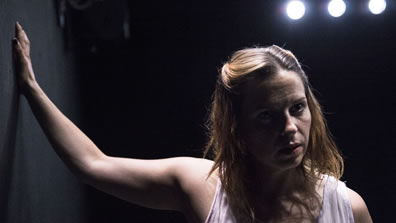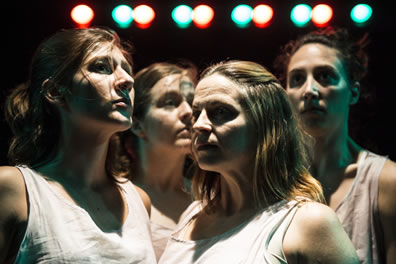Enter Ophelia, distracted
Minding the Madness
Taffety Punk Theatre Company, Capitol Hill Arts Workshop, Washington, D.C.
Friday, June 20, 2014, middle of box theater
Directed by Kimberly Gilbert, Marcus Kyd, Erin F. Mitchell. Choreography by Erin F. Mitchell
 When talking about William Shakespeare's most complex characters—including the famous Dane in his own eponymous play—Kimberly Gilbert adds Hamlet's on-again, off-again girlfriend, Ophelia, to the discussion. In fact, her Ophelia proves to be so complex she requires four dancer/actresses to play her in Enter Ophelia, distracted, a Taffety Punk Theatre Company production that takes us deep inside the mind of this fragile, abused woman.
When talking about William Shakespeare's most complex characters—including the famous Dane in his own eponymous play—Kimberly Gilbert adds Hamlet's on-again, off-again girlfriend, Ophelia, to the discussion. In fact, her Ophelia proves to be so complex she requires four dancer/actresses to play her in Enter Ophelia, distracted, a Taffety Punk Theatre Company production that takes us deep inside the mind of this fragile, abused woman.
Ironically, this four-person movement theater piece started as a one-woman show. Nine years in development, but only 30 minutes in telling, the journey to Enter Ophelia, distracted's premiere at the Washington, D.C., Capitol Hill Arts Workshop's Black Box Theater on Friday actually dates back to Gilbert's childhood when she watched Helena Bonham-Carter's Ophelia in Franco Zefferelli's film version of Hamlet. In collaboration with Director Marcus Kyd and Choreographer Erin F. Mitchell, Gilbert expanded her initial take on a single stage direction in Shakespeare's play into a full-fledged exploration of Ophelia's mind as she is buffeted by the forces and expectations of a rotten Denmark.
Joining Gilbert on the stage, all dressed in the same loose-fitting off-white tank tops and gray leotards, are Eleni Grove, Katie Murphy, and Erin White. Over to the side is Amy Domingues on cello, providing a constant soundtrack of her own composition. The rest of the auralscape comprises voices and occasional other sounds (Kyd is the production's sound designer). We do not see any of the other characters in the play, but we hear them, and we experience them through Ophelia.
And that gives us a new perspective on them. Laertes (the voice of Dan Crane) keeps hammering on the word "fear" as he lectures Ophelia. "Fear it, Ophelia, fear it, my dear sister," he pronounces sternly. "Be wary then: best safety lies in fear." Polonius (Ed Gero) comes across as belittling: "You speak like a green girl," he says. "Tender yourself more dearly or you'll tender me a fool." Hamlet (voiced by Kyd) is vicious, an Angel who turns Angelus on her. "I loved you not" breaks her heart. "Get thee to a nunnery" times five breaks her spirit. "A certain convocation of worms are e'en at him," this of her dead father, breaks her mind.
Along the way, we see Ophelia come undone from the inside out. Gilbert, Grove, Murphy, and White play Ophelia in unison at the start but gradually begin to diverge in their movements. At one point we see them pairing up, portraying a split personality. They parade in a square, and sudden jarring noises cause them to convulse. They stand in front of a mirror, individually worrying over their hair, face, breasts, figures. Notably, the mirror is the audience, and these behaviors are funny enough to inspire laughter, a reflection on our stake in the woman's self-esteem. During the Mousetrap scene, the foursome Ophelia sits on the ground literally trying to hold herself together, the behaviors growing increasingly disjointed as she listens to the Player Queen's speech (voiced by Lise Bruneau) about living only through her husband.
Through Mitchell's choreography, we are watching a mind wracked, cracking, and disintegrating. It is a vivid portrayal of the mind itself in a panic attack or a psychotic episode, and I can attest to the portrayal's accuracy. The final snap comes upon Hamlet's joke about Ophelia's father being in hell. The lights go off, and after a brief moment they come back on to reveal Gilbert, Grove, Murphy, and White occupying different spheres of the stage and a mound of flowers in the center.
And Ophelia speaks for the first time: "Where is the beauteous majesty of Denmark?" Gilbert says. Only in total madness does Ophelia find her voice. Only then does anyone really notice her. For the play's madness scene, the four actresses sing snatches of the songs together, and while Gilbert leads the way on speaking most of the lines, the other three provide echoes and whispering interludes. We are hearing the voices inside Ophelia's head as well as seeing her multiple personalities. "Lord, we know what we are, but know not what we may be," she says, emphasizing the word we.
Gilbert delivers one line with poignant clarity: "They bore him barefaced on the bier, hey non nonny, nonny, hey nonny." This is a song in the text, but Gilbert speaks this as a shaft of sanity splitting through her fractured senses, but she then gets hung up on the "non"sense. "I would give you some violets, but they withered all when my father died: they say he made a good end…" Gilbert trails off, distractedly, from this thought (there is a dash in the text at this point) while the other three actresses wander off the stage leaving Gilbert alone. It reminds me of Beatrice's line in Much Ado About Nothing: "In our last conflict four of his five wits went halting off, and now is the whole man governed with one." Not so funny a visual here.
The word mad appears in Hamlet 11 times, and I think we hear all 11 utterances of the word in this production. Each use of mad, however, references Hamlet; and yet Ophelia is the only one who is unquestionably mad in the play. Shakespeare feints the audience with Hamlet's mad behavior and then suddenly surprises us with true madness; when you are inside Ophelia's head, however, it doesn't surprise (but the snap is still a shock). And because with Enter Ophelia, distracted we are watching the play through Ophelia, Gilbert reminds us that she is in the room when Hamlet delivers his "To be or not to be" soliloquy. As we hear this speech in voiceover, the four-part Ophelia dances with image-filled choreography to Hamlet's lines. Even if Ophelia is not meant to overhear Hamlet's famous soliloquy, Shakespeare at least puts her in the speech's proximity while Hamlet is totally alone in all his other soliloquies. Gilbert suggests the speech has a psychological impact on Ophelia that she carries to the brook's bank.
Left alone on stage after noting that her father "made a good end," Gilbert's Ophelia says, "God ha' mercy on his soul! And of all Christian souls, I pray God." She picks up a couple of flowers and holds them high, reaching, reaching. "God be wi' ye," she says to the audience, and she is relaxed, at peace, as she backs upstage, turns, and walks off. The lights go down on the cellist, playing out the dying strands of Ophelia's exit.
To say this is powerful theater is to say a nuclear blast does a lot of damage.

From left, Erin White, Katie Murphy, Kimberly GIlbert, and Elini Grove play Ophelia in Taffety Punk's Enter Ophelia, distracted. Top, Gilbert, the show's creator, speaks the title character's first line after the stage direction in Hamlet that is this production's title. Photos by Teresa Castracane, Taffety Punk.
With the play's short runtime, Taffety Punk signed up four local dance companies, each to serve as an opening act during the production's four-show run (which, reportedly, is already sold out). Opening on the first night was Contradiction Dance, a four-woman dance troupe. One of its numbers is a dance to #YesAllWomen on Twitter, the hashtag created in the wake of the Elliot Rodger shooting rampage in Santa Barbara. This phenomenal social network movement exposes the near constant sexual harassment and omnipresent threat of violence all women—yes, all women—live with. The #YesAllWomen piece proves an apt table-setter for Gilbert's exploration of Ophelia's madness. The fear her brother instills in her, the disrespect her father shows her, the cruelty her boyfriend displays upon her rejecting him, and all three men and even Gertrude objectifying her as a sex object factor into her disintegration.
Does Shakespeare also objectify her? Or is it we, the collective critic who dismiss Ophelia's stature among Elsinore's population. My own general disrespect for Ophelia is recorded on this website. "Through 11 stage performances, a half dozen movie versions, and countless readings of this play, I have long considered the women in Hamlet to lack much substance, especially compared to Shakespeare's usual portraits of women." I wrote this in my review of the Shakespeare Forum's version of Hamlet, leading into my describing my high regard for Andrus Nichols' portrayal of Gertrude in that production. "Ophelia, in capable hands, can be intriguing if the actress balances the girl's fortitude at the start with her madness in the end and believably works through the pivotal nunnery scene in the middle—no easy task, but I've seen it done." Am I being judgmental of Shakespeare there, or Ophelia herself? Is she, in my mind, something less than an "intriguing" woman simply because she falls victim to constant objectivity and abuse from her family, friends, and society in general?
But really, it's not what is in my mind but her mind—and, yes, all women's minds in Ophelia's situation—that matters most. And Gilbert has opened Ophelia's mind to all of us.
Eric Minton
June 23, 2014
Comment: e-mail [email protected]
Start a discussion in the Bardroom



 Find additional Shakespeareances
Find additional Shakespeareances